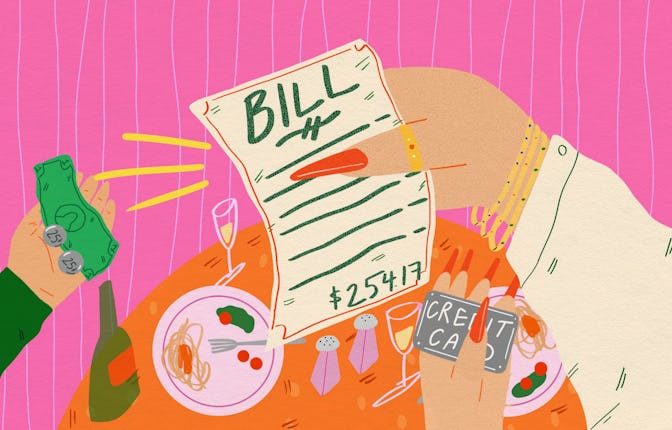The complexity of having (or being) a platonic sugar daddy
Does it matter if one friend constantly foots the bill?

I can venture a guess that not everyone in your friend circle is at exactly the same socioeconomic level. Because this is natural, a very fascinating financial phenomenon can occur: The platonic sugar daddy. When one person in the relationship has a lot more resources than another, it can seem like the friend who pays for everything is always giving generosity and never receiving it. But relationships aren't that clear cut. Most psychologists agree that there is a sophisticated economic interplay in relationships that involves more than money. But how do you keep a friendship emotionally balanced even if it's economically off kilter?
“The thing with generosity is that it is an outflow,” says Ian Sells, an entrepreneur in California who is the most “financially blessed amongst his friend group. “You give because you enjoy doing it. If you give because you expect something in return, that's not friendship. That's a business.” Sells explains that he ends up paying for a lot of extra things in his trio of close friends — a defacto non-sexual sugar daddy, if you will — but that he doesn’t mind.
Sells doesn’t see this as emotionally complicated at all — Sells pays for more things because he can. Sells doesn’t describe his generosity as part of his love language, but some people do consider gift-giving their primary love language. For those folks, it doesn’t just feel good to give, they really need it to feel like they’re doing their part in the relationship.
Honestly, I thought when I wrote this that I would talk to a lot of people who were secretly resentful about having to pay for everything with their friends, but that wasn’t the case at all. In fact, although Sells has a particularly charming humble attitude about sharing his resources, most sugar zaddies I talked to felt similarly. It was the friends who had less who seemed to have more complicated feelings about their mixed status relationships.
Emma Miles, a pet care consultant and blogger in South Africa tells me that she used to stress out about her relationship with a female friend who foots the bill. “I was worried about owing something to her or that I should pay her back somehow,” Sells explains. I heard this concern and confusion about how to pat wealthier friends back from a lot of people in Miles’s situation. The truth is that although a lot of us fantasize about getting a free ride, in real life it can make us feel indebted to friends in an uncomfortable way.
The best thing for friends who have a wealth imbalance in their relationship is to explicitly talk about the situation. As you might imagine, it may not be easy. Talking about money often feels loaded, even more so when money has an effect on your relationship. “It can be quite awkward and even provoke feelings of shame, inadequacy, anger, fear of abandonment, and other deep emotions,” says Bridgit Dengel Gaspard, a psychotherapist in Brooklyn.
Gaspard thinks that it will be easiest if you start by speaking in general terms. Gaspard recommends saying something like, “We both know our financial situations are so different from each other’s and I think it’s better we talk about things together so we know how we each feel.” This lets your friend know that you are willing to have uncomfortable conversations with them for the sake of your friendship and that you care about their feelings.
It feels important to note that consent should be requested not just from the giver, but also from the receiver. While some people may express their care through giving, not everyone feels great about getting gifts, or they may only enjoy receiving certain kinds of things. It’s crucial to make sure that everyone involved is enjoying the exchange and to be specific.
After that, says Gaspard, the most important thing you can do is listen. Then try to negotiate some boundaries that will make both of you feel okay with everything. Maybe you decide that whoever pays for a night out gets to choose the activity, that you will split bills over a certain amount, or that the person who has less money will only pay for things under 20 bucks. This is where you get to collaborate with your friend to make sure both of your needs are being met and that cash flow differences don’t create a disruption in the flow of your friendship.
That’s exactly what Miles and her friend did. When she got up the courage to talk to her platonic sugar zaddie, she found out that her friend actually got a lot out of paying for her. “She explained that giving is how she expresses love,” says Miles. It turned out that Miles’ friend felt really great about getting to treat. And, Miles tells me, the conversation also helped her understand what she brings to the relationship. “I also do things she cannot provide,” Miles said. Her friend told her that her ability to listen without judgment was worth more than money.
Miles and her homie came to an agreement about how to split financial and emotional labor in a way that made good economic and emotional sense for both of them. Frankly, it sounds like an important conversation to have even if there isn’t some obvious kind of imbalance in a relationship. We could all do with a lot more honest conversations about how to make the people we love know we love them. And it doesn’t have to feel transactional either. As Sells says, “friendship is never about measuring benefits.” But it is about receiving mutual benefits, and it never hurts to ask what a friend needs whether they pay your way or not.